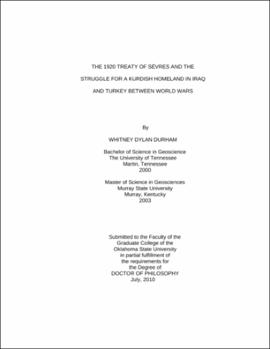| dc.contributor.advisor | Hanks, Reuel | |
| dc.contributor.author | Durham, Whitney Dylan | |
| dc.date.accessioned | 2013-11-26T08:24:06Z | |
| dc.date.available | 2013-11-26T08:24:06Z | |
| dc.date.issued | 2010-07 | |
| dc.identifier.uri | https://hdl.handle.net/11244/6769 | |
| dc.description.abstract | Scope and Method of Study: | |
| dc.description.abstract | This dissertation is an examination of the rise and fracturing of Kurdish nationalism and territoriality in the context of the 1920 Treaty of Svres and the division of the defeated Ottoman Empire, and of the ensuing British and Turkish policies toward the Kurds in Iraq and Turkey during the period between world wars. The primary sources used in this study are declassified British diplomatic and intelligence documents. The analysis focuses on the Kurdish struggle through the lenses of nationalism, territoriality, and political geography, particularly Mackinder's Geographical Pivot/Heartland Theory and Spykman's Rimland Theory. | |
| dc.description.abstract | Findings and Conclusions: | |
| dc.description.abstract | The convergence of events that occurred following the war prevented a Kurdish state from becoming a reality by overtaking the issue as it had been presented at Sevres. The document resulting from the Paris Peace Conference and maps associated with its idea of Kurdistan were symbolic in recognizing the Kurds as a people with a right to a homeland. The treaty was used as a rallying point for future Kurdish nationalist movements by reinforcing ideas of nationalism and territoriality. Kurdish efforts to secure an independent Kurdistan failed because of their lack of cohesion and the overwhelming geopolitical forces surrounding them. The British disallowed an independent Kurdistan because circumstances changed regarding British relations with Turkey. To the British, Turkey provided the right balance for the region to keep the Soviet Union in check in the region. The Turks disallowed Kurdish statehood because they believed the Kurds to be essential to their new Turkish republic as citizens, soldiers, and laborers with a recast Turkish civic identity. | |
| dc.format | application/pdf | |
| dc.language | en_US | |
| dc.rights | Copyright is held by the author who has granted the Oklahoma State University Library the non-exclusive right to share this material in its institutional repository. Contact Digital Library Services at lib-dls@okstate.edu or 405-744-9161 for the permission policy on the use, reproduction or distribution of this material. | |
| dc.title | 1920 Treaty of Sevres and the struggle for a Kurdish homeland in Iraq and Turkey between world wars | |
| dc.contributor.committeeMember | Lightfoot, Dale | |
| dc.contributor.committeeMember | Bays, Brad | |
| dc.contributor.committeeMember | Jenswold, Joel | |
| osu.filename | Durham_okstate_0664D_10996.pdf | |
| osu.accesstype | Open Access | |
| dc.type.genre | Dissertation | |
| dc.type.material | Text | |
| dc.subject.keywords | great game | |
| dc.subject.keywords | heartland | |
| dc.subject.keywords | kurdistan | |
| dc.subject.keywords | kurds | |
| dc.subject.keywords | mackinder | |
| dc.subject.keywords | rimland | |
| thesis.degree.discipline | Geography | |
| thesis.degree.grantor | Oklahoma State University | |
